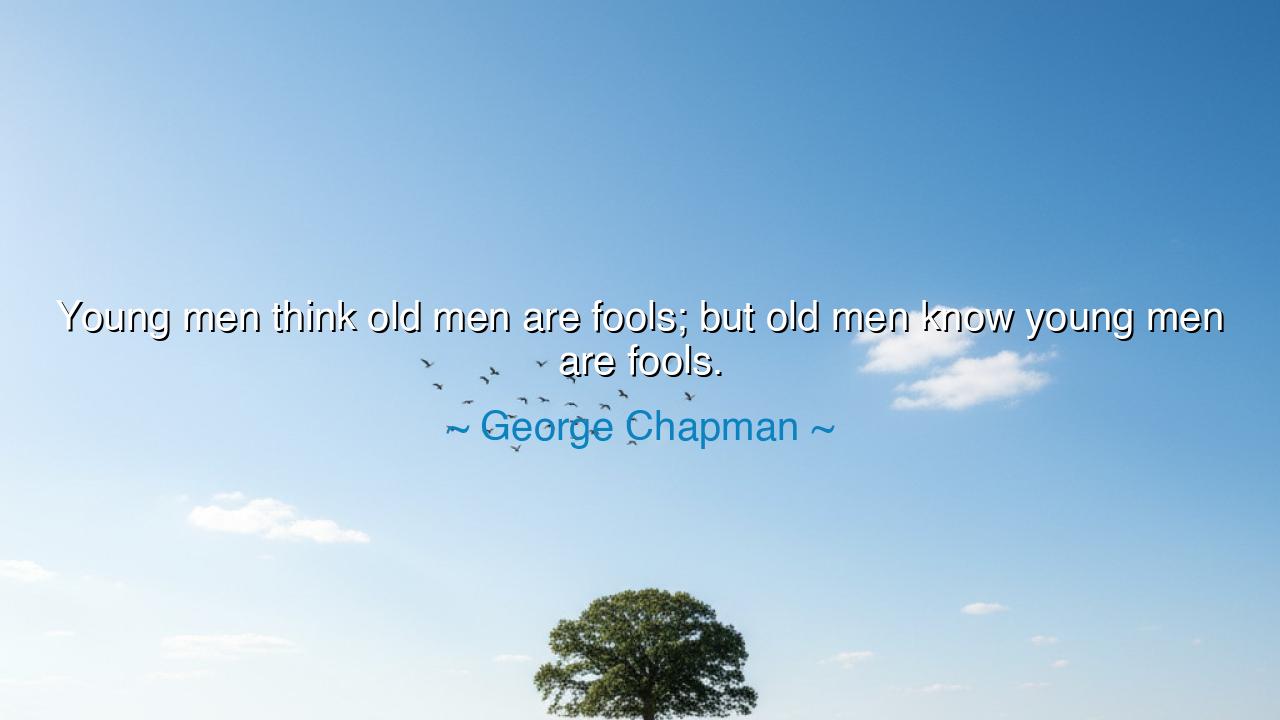
Young men think old men are fools; but old men know young men are






Hear the timeless words of George Chapman, poet and philosopher, who declared: “Young men think old men are fools; but old men know young men are fools.” This saying is no insult but a mirror, reflecting the cycle of pride and wisdom that has turned since the dawn of mankind. The young, filled with strength and restless ambition, often see the aged as weak, outdated, and bound by caution. Yet the old, having walked the fiery roads of youth themselves, know from experience the follies of inexperience, the blindness of passion, and the arrogance of thinking one has nothing left to learn.
The origin of this truth lies in the eternal struggle between youth and age. From the days of ancient Greece, elders warned against the hubris of the young, who mocked the gray hairs as relics of the past. And yet, every elder was once young, and in their own youth they too thought themselves wiser than their fathers. Thus the saying of Chapman pierces with irony: the young believe the old to be fools, but the old, having lived both roles, know with certainty the errors of youth. This is not bitterness, but the clarity that only time bestows.
History gives us countless examples. Consider the story of Rehoboam, son of King Solomon. When he ascended the throne of Israel, the people sought mercy from the heavy burdens laid upon them by his father. The elders counseled him to answer with kindness, promising loyalty if he did. But Rehoboam rejected their wisdom and listened instead to the rash voices of his young companions, who urged him to rule with harshness. His pride led to rebellion, and the kingdom was torn in two. Here we see Chapman’s truth made flesh: the young man believed the elders were fools, but his folly shattered a nation.
So too in more recent times, in the trenches of the Great War, eager commanders, young and brash, sent countless soldiers charging into machine-gun fire, dismissing the cautious counsel of veterans who understood the new face of battle. They thought themselves bold and visionary, yet their choices led to slaughter. The old men, seasoned by experience, knew the cost of such folly, for they had once been the young who rushed unthinkingly into disaster. The cycle repeated, as it always does, for human pride is slow to learn.
Yet Chapman’s words are not only a rebuke, but a lesson. They remind us that wisdom comes not from age alone, but from reflection on experience. Not every old man is wise, but every old man has lived through the errors that youth still believes are triumphs. The challenge for the young is to humble themselves, to listen before time teaches them through pain. The challenge for the old is to guide with patience, remembering that they too once thought their elders fools. Thus harmony is found when both generations learn from each other—the vigor of the young tempered by the wisdom of the old.
The lesson for us, therefore, is clear: if you are young, do not despise the counsel of age, for the paths you walk have been trodden before, and the warnings you hear are written in blood and tears. And if you are old, do not mock the pride of the young, but teach them with patience, offering your wisdom as a gift hard-earned. In this exchange lies the strength of families, communities, and nations. For when the young scorn the old, folly rules; but when the old mentor the young, wisdom guides.
Therefore, O listener, carry Chapman’s words as a double-edged truth. If you are young, wear humility like armor; if you are old, wield patience like a staff. And remember always: time humbles us all. The young man’s folly is to think himself invincible; the old man’s wisdom is to know that invincibility is an illusion. Learn this lesson swiftly, and you will walk with strength and prudence through the years.






AAdministratorAdministrator
Welcome, honored guests. Please leave a comment, we will respond soon